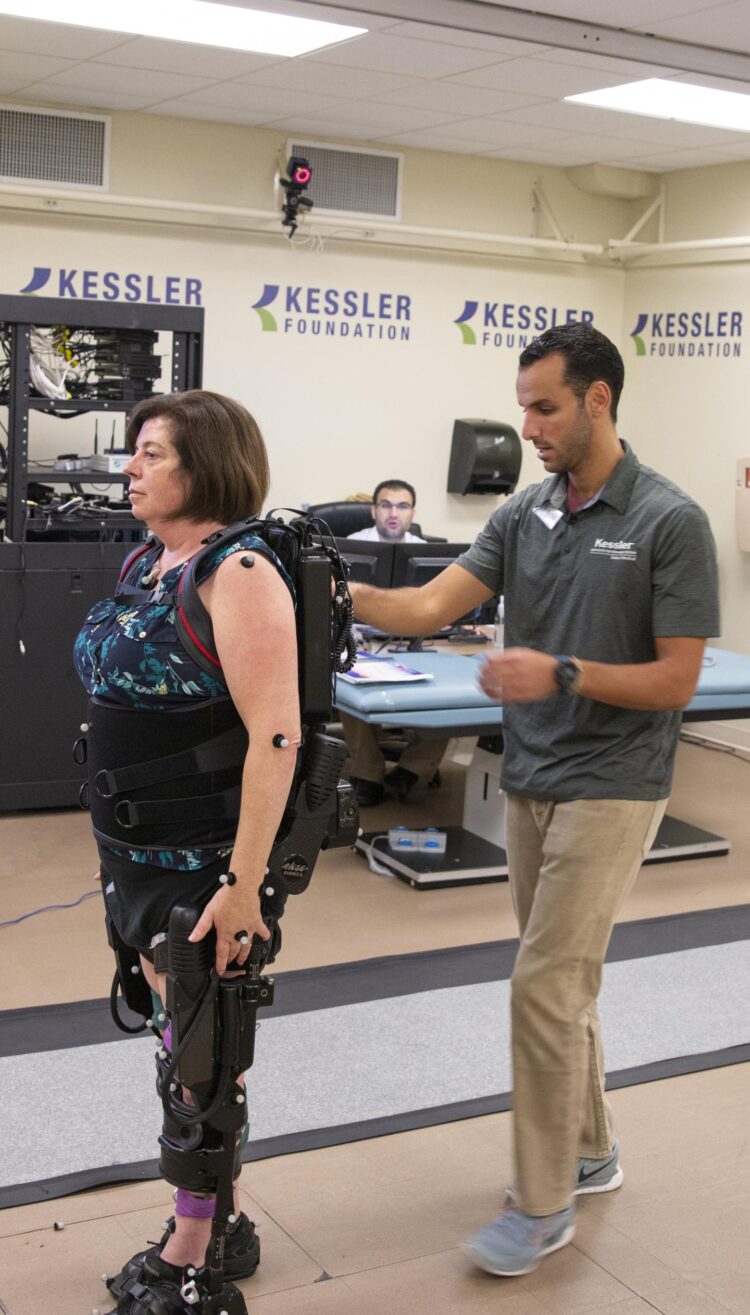A pilot study led by Kessler Foundation researchers provided proof of concept for robotic-exoskeleton assisted exercise rehabilitation (REAER) in people with substantial MS-related neurological disability
East Hanover, NJ. May 28, 2021. A team of multiple sclerosis (MS) experts at Kessler Foundation led the first pilot randomized controlled trial of robotic-exoskeleton assisted exercise rehabilitation (REAER) effects on mobility, cognition, and brain connectivity in people with substantial MS-related disability. Their results showed that REAER is likely an effective intervention, and is a promising therapy for improving the lives of those with MS.
The article, “A pilot randomized controlled trial of robotic exoskeleton-assisted exercise rehabilitation in multiple sclerosis,” (doi: 10.1016/j.msard.2021.102936) was published on April 4, 2021, by Multiple Sclerosis and Related Disorders. It is available open access at https://www.msard-journal.com/article/S2211-0348(21)00203-0/fulltext.
The authors, are Ghaith J. Androwis, PhD, Brian M. Sandroff, PhD, Peter Niewrzol, MA, Glenn R. Wylie, DPhil, Guang Yue, PhD, and John DeLuca, PhD, of Kessler Foundation, and Farris Fakhoury, DPT, of Kessler Institute for Rehabilitation.
It is common for people with MS to experience impairments in both mobility and cognition, and few therapies exist to manage the range of debilitating symptoms. This lack of treatment options is a major problem for people with MS, especially those with substantial MS-related neurological disability.
Previous research shows that exercise rehabilitation, such as walking, is an effective approach to symptom management, with some research suggesting that even a single exercise rehabilitation intervention can improve both mobility and cognition.
Yet there is a lack of efficacy of exercise rehabilitation on mobility and cognitive outcomes in people with MS who have substantial disability. Adaptive exercise rehabilitation approaches such as body-weight supported treadmill training and robot-assisted gait training have not demonstrated convincing results. Moreover, adaptive interventions lack key interactions between patients and therapists that may improve efficacy.
In this pilot study of 10 participants with significant MS-related neurological disability, researchers explored the use of robotic exoskeletons to manage symptoms. Rehabilitation exercise using robotic exoskeletons is a relatively new approach that enables participants to walk over-ground in a progressive regimen that involves close engagement with a therapist. The Foundation has dedicated a Ekso NR to MS studies to facilitate further research in this area.
Investigators compared participants’ improvement after four weeks of REAER vs four weeks of conventional gait training, looking at functional mobility, walking endurance, cognitive processing speed, and brain connectivity.
The results were positive: Relative to conventional gait training, four weeks of REAER was associated with large improvements in functional mobility (ηp2=.38), cognitive processing speed (ηp2=.53), and brain connectivity outcomes, most significantly between the thalamus and ventromedial prefrontal cortex (ηp2=.72). “Four weeks is relatively short for an exercise training study,” noted Dr. Sandroff, senior research scientist at Kessler Foundation and director of the Exercise Neurorehabilitation Research Laboratory. “Seeing improvements within this timeframe shows the potential for exercise to change how we treat MS. Exercise is really powerful behavior that involves many brain regions and networks that can improve over time and result in improved function.”
“This is particularly exciting because therapy using robotic exoskeletons shows such promise for improving the lives of people with co-occurring mobility and cognitive disability, a cohort that likely has the greatest potential to benefit from this new technology,” said Dr. Androwis, lead author and research scientist in the Center for Mobility and Rehabilitation Engineering Research at Kessler Foundation. “We’re eager to design a larger trial to further study these effects. Based on our initial results, we’re optimistic that this approach may be superior to the current standard of care.”
###
Funding sources: National Multiple Sclerosis Society, USA (Collaborative Network of New Jersey), Award Number: CA1069-A-7; and Joy and Avi Avidan, New Jersey, USA.
About Kessler Foundation: Kessler Foundation, a major nonprofit organization in the field of disability, is a global leader in rehabilitation research that improves cognition, mobility and long-term outcomes, including employment, for people with neurological disabilities caused by diseases and injuries of the brain and spinal cord. Kessler Foundation leads the nation in funding innovative programs that expand opportunities for employment for people with disabilities. Learn more by visiting http://www.
Contact: Carolann Murphy, PA, [email protected]
Media Contact
Carolann Murphy
[email protected]
Original Source
https:/
Related Journal Article
http://dx.





